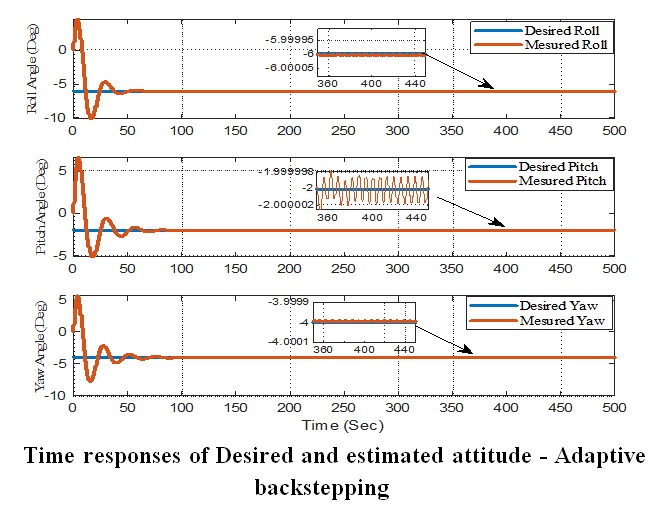Adaptive Nano Satellite Attitude Control Design under Multiplicative Actuator Uncertainties
DOI:
https://doi.org/10.57056/ajet.v9i1.164Keywords:
backstepping control, attitude control, nanosatellite, multiplicative fault observer, adaptive algorithmAbstract
The utilization of nanosatellites in space missions has sparked significant interest owing to their compact size and relatively economical development, launch, and operational expenses in comparison to larger satellites. This cost-effectiveness facilitates more frequent launches and the capability to replace or upgrade satellites with greater frequency. The stability of nanosatellites is paramount for their successful operation in space, necessitating designers and engineers to implement various measures to ensure the satellite maintains its orientation and position throughout its mission. In this paper, an adaptive control methodology relies on backstepping control theory is suggested to address the multiplicative faults in the actuators. Specifically, the control system's efficacy is demonstrated through numerical simulations for 3-axis stabilization. The outcomes reveal that the proposed control approach adeptly sustains the stability of the nanosatellites in the event of actuator failure, outperforming classical backstepping control.
References
Finger A. Satellite positioning and navigation: Fundamentals, operation and application of global navigation satellite systems. AEU-Int J Electron Commun. 2010:694-5. https://doi.org/10.1016/j.aeue.2010.04.001
Jaswar, Fitri, et al. Design and validation of an adaptive CubeSat transmitter system. AEU-Int J Electron Commun. 2019;108:118-26. https://doi.org/10.1016/j.aeue.2019.05.019
Berthet M, et al. Feasibility assessment of passive stabilisation for a nanosatellite with aeroshell deployed by orbit-attitude-aerodynamics simulation platform. Acta Astronaut. 2020;173:266-78. https://doi.org/10.1016/j.actaastro.2020.04.043
Yoon H, Seo HH, Choi HT. Optimal uses of reaction wheels in the pyramid configuration using a new minimum infinity-norm solution. Aerosp Sci Technol. 2014;39:109-19. http://dx.doi.org/10.1016/j.ast.2014.09.002
Li J, et al. Design of attitude control systems for CubeSat-class nanosatellite. J Control Sci Eng. 2013;2013:4-4. https://doi.org/10.1155/2013/657182
Liang X, et al. Observer-based H∞ fault-tolerant attitude control for satellite with actuator and sensor faults. Aerosp Sci Technol. 2019;95:105424. https://doi.org/10.1016/j.ast.2019.105424
Miao Y, et al. Adaptive fast nonsingular terminal sliding mode control for attitude tracking of flexible spacecraft with rotating appendage. Aerosp Sci Technol. 2019;93:105312. https://doi.org/10.1016/j.ast.2019.105312
Liu M, Shao X, Ma G. Appointed-time fault-tolerant attitude tracking control of spacecraft with double-level guaranteed performance bounds. Aerosp Sci Technol. 2019;92:337-46. https://doi.org/10.1016/j.ast.2019.06.017
Zhang C, et al. Neural-networks and event-based fault-tolerant control for spacecraft attitude stabilization. Aerosp Sci Technol. 2021;114:106746. https://doi.org/10.1016/j.ast.2021.106746
Golzari A, et al. Quaternion based linear time-varying model predictive attitude control for satellites with two reaction wheels. Aerosp Sci Technol. 2020;98:105677. https://doi.org/10.1016/j.ast.2019.105677
Gao S, et al. Adaptive fuzzy fault-tolerant control for the attitude tracking of spacecraft within finite time. Acta Astronaut. 2021;189:166-80. https://doi.org/10.1016/j.actaastro.2021.08.033
Cong B, Liu X, Chen Z. Backstepping based adaptive sliding mode control for spacecraft attitude maneuvers. Aerosp Sci Technol. 2013;30(1):1-7. https://doi.org/10.1109/CONTROL.2012.6334777
Giri DK, Sinha M. Robust backstepping magnetic attitude control of satellite subject to unsymmetrical mass properties. J Spacecr Rockets. 2019;56(1):298-305. https://doi.org/10.2514/1.A34298
Zhao L, Yu J, Shi P. Command filtered backstepping-based attitude containment control for spacecraft formation. IEEE Trans Syst Man Cybern Syst. 2019;51(2):1278-87. https://doi.org/10.1109/TSMC.2019.2896614
Sun L, Zheng Z. Disturbance-observer-based robust backstepping attitude stabilization of spacecraft under input saturation and measurement uncertainty. IEEE Trans Ind Electron. 2017;64(10):7994-8002. https://doi.org/10.1109/TCST.2017.2669145
Cao X, Shi P, Li Z, et al. Neural-network-based adaptive backstepping control with application to spacecraft attitude regulation. IEEE Trans Neural Netw Learn Syst. 2017;29(9):4303-13. https://doi.org/10.1109/TNNLS.2017.2756993
Crassidis JL, Markley FL. Sliding mode control using modified Rodrigues parameters. J Guid Control Dyn. 1996;19(6):1381-3. https://doi.org/10.2514/3.21798
Lee KW, Singh SN. Composite Immersion and Invariance Based Adaptive Attitude Control of Asteroid-Orbiting Spacecraft in Elliptic Orbit. 2021. http://dx.doi.org/10.21203/rs.3.rs-304417/v1
Benmansour JE, et al. Satellite Attitude Control Based Adaptive sliding Mode Method. Alger J Eng Res. 2019;4(1):6-11. https://www.asjp.cerist.dz/en/article/126923
Boussadia H, et al. Sliding Mode Control Based on Backstepping Approach for Microsatellite Attitude Pointing. Eng Proc. 2022;14(1):24. https://doi.org/10.3390/engproc2022014024

Downloads
Published
How to Cite
Issue
Section
License
Copyright (c) 2024 Rima Roubache, Jalal Eddine Benmansour, Akram Adnane

This work is licensed under a Creative Commons Attribution-NonCommercial 4.0 International License.





